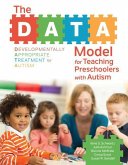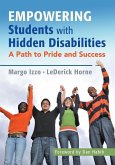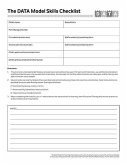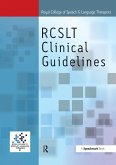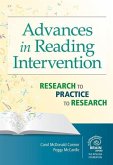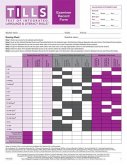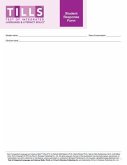Meg Grigal, Debra Hart
Think College!
Postsecondary Education Options for Students with Intellectual Disabilities
Meg Grigal, Debra Hart
Think College!
Postsecondary Education Options for Students with Intellectual Disabilities
- Broschiertes Buch
- Merkliste
- Auf die Merkliste
- Bewerten Bewerten
- Teilen
- Produkt teilen
- Produkterinnerung
- Produkterinnerung
Uncovers the big picture of postsecondary options and reveals how to support students with disabilities before, during, and after a successful transition to college. This book features vignettes and first-person narratives from students and families that underscore the benefits and challenges of PSE.
Andere Kunden interessierten sich auch für
![The Data Model for Teaching Preschoolers with Autism The Data Model for Teaching Preschoolers with Autism]() Ilene S SchwartzThe Data Model for Teaching Preschoolers with Autism68,99 €
Ilene S SchwartzThe Data Model for Teaching Preschoolers with Autism68,99 €![Empowering Students with Hidden Disabilities Empowering Students with Hidden Disabilities]() Margo Vreeburg IzzoEmpowering Students with Hidden Disabilities38,99 €
Margo Vreeburg IzzoEmpowering Students with Hidden Disabilities38,99 €![Project Data Skills Checklist Forms Project Data Skills Checklist Forms]() Ilene S SchwartzProject Data Skills Checklist Forms33,99 €
Ilene S SchwartzProject Data Skills Checklist Forms33,99 €![Royal College of Speech & Language Therapists Clinical Guidelines Royal College of Speech & Language Therapists Clinical Guidelines]() Sylvia Taylor-GohRoyal College of Speech & Language Therapists Clinical Guidelines82,99 €
Sylvia Taylor-GohRoyal College of Speech & Language Therapists Clinical Guidelines82,99 €![Advances in Reading Intervention: Research to Practice to Research Advances in Reading Intervention: Research to Practice to Research]() Carol McDonald ConnorAdvances in Reading Intervention: Research to Practice to Research43,99 €
Carol McDonald ConnorAdvances in Reading Intervention: Research to Practice to Research43,99 €![Test of Integrated Language and Literacy Skills(tm) (Tills(tm)) Examiner Record Forms Test of Integrated Language and Literacy Skills(tm) (Tills(tm)) Examiner Record Forms]() Nickola NelsonTest of Integrated Language and Literacy Skills(tm) (Tills(tm)) Examiner Record Forms53,99 €
Nickola NelsonTest of Integrated Language and Literacy Skills(tm) (Tills(tm)) Examiner Record Forms53,99 €![Test of Integrated Language and Literacy Skills(tm) (Tills(tm)) Student Response Forms Test of Integrated Language and Literacy Skills(tm) (Tills(tm)) Student Response Forms]() Nickola NelsonTest of Integrated Language and Literacy Skills(tm) (Tills(tm)) Student Response Forms53,99 €
Nickola NelsonTest of Integrated Language and Literacy Skills(tm) (Tills(tm)) Student Response Forms53,99 €-
-
-
Uncovers the big picture of postsecondary options and reveals how to support students with disabilities before, during, and after a successful transition to college. This book features vignettes and first-person narratives from students and families that underscore the benefits and challenges of PSE.
Hinweis: Dieser Artikel kann nur an eine deutsche Lieferadresse ausgeliefert werden.
Hinweis: Dieser Artikel kann nur an eine deutsche Lieferadresse ausgeliefert werden.
Produktdetails
- Produktdetails
- Verlag: Brookes Publishing Company
- Seitenzahl: 344
- Erscheinungstermin: 3. November 2009
- Englisch
- Abmessung: 251mm x 175mm x 20mm
- Gewicht: 590g
- ISBN-13: 9781557669179
- ISBN-10: 1557669171
- Artikelnr.: 27849693
- Herstellerkennzeichnung
- Libri GmbH
- Europaallee 1
- 36244 Bad Hersfeld
- gpsr@libri.de
- Verlag: Brookes Publishing Company
- Seitenzahl: 344
- Erscheinungstermin: 3. November 2009
- Englisch
- Abmessung: 251mm x 175mm x 20mm
- Gewicht: 590g
- ISBN-13: 9781557669179
- ISBN-10: 1557669171
- Artikelnr.: 27849693
- Herstellerkennzeichnung
- Libri GmbH
- Europaallee 1
- 36244 Bad Hersfeld
- gpsr@libri.de
Dr. Meg Grigal is a Senior Research Fellow at University of Massachusetts Boston at the Institute for Community Inclusion where she Co-Directs Think College. Dr. Grigal is the Co-Principal Investigator for the NIDRR funded Center on Postsecondary Education for Individuals with Intellectual Disabilities, the Office of Postsecondary Education funded National Coordinating Center and the Administration on Developmental Disabilities funded Consortium for Postsecondary Education for People with IDD. Prior to joining ICI, Meg was Senior Research Associate at TransCen, Inc. where she served as the Principal Investigator of the Postsecondary Education Research Center (PERC) project, conducting research on the efficacy and outcomes of college based dual enrollment programs for students with intellectual disability. Dr. Grigal also previously directed On-Campus Outreach (OCO) at the University of Maryland. She has provided technical assistance and training across the country, conducted research studies on the provision of postsecondary education services for students with intellectual disability and has coauthored two books and published numerous journal articles on the topic. Debra Hart is the Director of the Education and Transition Team for the Institute for Community Inclusion at the University of Massachusetts, Boston. She serves as the Principal Investigator for the NIDRR funded Center on Postsecondary Education for Individuals with Intellectual Disabilities, the ADD funded Consortium on Postsecondary Education for Individuals with Developmental Disabilities and Office of Postsecondary Education funded National Coordinating Center. Debra has over 25 years of experience working with youth and adults with disabilities, their families, faculty, and professionals that support youth in becoming contributing valued members of their community via participation in inclusive secondary and postsecondary education, and competitive employment. Since 1997, Ms. Hart has directed five federal grants designed to create access to postsecondary education for youth with intellectual disabilities. Madeleine Will is the Director of the National Down Syndrome Society (NDSS) National Policy Center. Ms. Will chairs the NDSS Transition and Postsecondary Education Initiative for individuals with intellectual disabilities (ID). Technical assistance from NDSS is provided to parents, educators, and institutions of higher education in developing and implementing high-quality services. NDSS systems change efforts include funding the development of model demonstration projects for students with intellectual disabilities in New Jersey and South Carolina. Ms. Will is the former Chairperson of the President's Committee for People with Intellectual Disabilities (PCPID) and the former Assistant Secretary of the Office of Special Education and Rehabilitation Services in the U.S. Department of Education. Amy Dwyre, M.S., a Senior Associate at TransCen, Inc., is the Project Coordinator on the Postsecondary Education Research Center (PERC) project funded by the Office of Special Education Programs (OSEP) to set up technical assistance centers and collect data on college-based transition programs for students with intellectual disabilities (ID). In addition, Ms. Dwyre is working on the Center for Postsecondary Education for Individuals with Intellectual Disabilities, in partnership with the Institute on Community Inclusion at the University of Massachusetts in Boston. The Center will conduct research and disseminate information on promising practices that support individuals with intellectual disabilities so that they can gain access to and be successful in inclusive postsecondary education. Formerly, she coordinated the Baltimore Transition Connection, a 5-year federally funded transition project for students with ID on 2- and 4-year colleges and universities in Baltimore, integrating the local school system, adult service providers, the colleges and universities, and the community. Ms. Dwyre is a national trainer for TransCen in the areas of transition, marketing and job development, special education, community classroom models, and self-determination. She has a masterâ (TM)s in rehabilitation counseling with a focus on transition and supported employment from the University of Illinois at Urbana-Champaign. Laura T. Eisenman, Ph.D., is an Associate Professor in the School of Education at the University of Delaware. Through the Universityâ (TM)s Center for Disabilities Studies (CDS), Dr. Eisenman also coordinates the interdisciplinary Disabilities Studies Minor. Since 2000, she has been faculty liaison to a campus program for young adults with significant disabilities, a collaborative effort of CDS and local school districts. Dr. Eisenmanâ (TM)s research centers on the transition to adult life for students with disabilities. She is currently studying the experiences of young adults and teachers in an inclusive technical high school. Her interests include understanding how schools can foster studentsâ (TM) self-determination and the social and community experiences of young adults with significant disabilities. She is on the editorial boards of Career Development for Exceptional Individuals and Review of Disability Studies. She received her Ph.D. in Special Education from Vanderbilt University and her masterâ (TM)s in rehabilitation counseling from University of South Florida-Tampa. Janice Fialka, LMSW, ACSW, is a nationally recognized speaker, author, and social worker with expertise in adolescent health, parent-professional partnerships, inclusion, and disability. Ms. Fialka has directed several teen health centers in Michigan, including the Taylor Teen Health Center, which she co-founded. Currently she is the Special Projects Trainer Michigan's Part C (of IDEA) Training and Technical Assistance. Ms. Fialka speaks and writes from her dual perspectives as a seasoned social worker and as a mother of two adult children, Micah and Emma, both of whom also present and write on disability issues from their unique perspectives. Micah, who has cognitive disabilities, is a strong advocate and has been fully included in general education and his community. Ms. Fialka and her husband co-produced the award winning DVD, Through the Same Door: Inclusion Includes College, which documents Micah's experiences as a college student. She has authored three books, various articles, a CD, and several poems. Ms. Fialka's website www.danceofpartnership.com is a highly regarded comprehensive resource for parents and professionals. She was awarded Social Worker of 2007 by the Michigan chapter of the National Association of Social Workers. In 2009, Ms. Fialka and her family received the Family Voices Lifetime Achievement Award in Washington, D.C. Stephanie Smith Lee, a Senior Policy Advisor for National Down Syndrome Society (NDSS), National Policy Center, provides technical assistance to parents, educators, and institutes of higher education on developing and implementing high quality services for students with disabilities. Ms. Lee is project leader for a systems change project in South Carolina that is funding new model programs at two universities. She speaks at state and national conferences and with the media. Ms. Lee also coordinates an expert group that provides advice to Congress on this topic of providing high quality services for students with disabilities at institutes of higher education. Ms. Lee previously served as the Director of the Office of Special Education Programs (OSEP) in the U.S. Department of Education. Richard G. Luecking, Ed.D., is the President of TransCen, Inc., a non-profit organization based in Rockville, Maryland, that is dedicated to improving education and employment outcomes for people with disabilities. Dr. Luecking has held this position since 1987, when he was charged by the Board of Directors as the organization's first employee to create improved linkages between schools, employment service providers, government, business, and families so that youth with disabilities experience improved post-school employment outcomes. During his tenure with the organization, he and his TransCen colleagues have been responsible for the design and implementation of numerous model demonstration and research projects related to school-to-work transition and employment of people with disabilities. He is the author of a range of publications on related topics, including the book, The Way to Work: How to Facilitate Work Experiences for Youth in Transition (Paul H. Brookes Publishing Co., 2009). Karen Doneker Mancini, M.Ed., is the Director of the Disability Support Services Office at the University of Delaware. Ms. Mancini is responsible for ensuring the Universityâ (TM)s compliance to the Americans with Disabilities Act (ADA). She has worked in this area since the institution of ADA in 1992 and has been on multiple taskforces to consider the effective implementation of ADA on college campuses. Ms. Mancini works with students, employees, and families to assist with identifying and implementing accommodations. In addition, she provides support to build self-awareness and self-advocacy for students and staff with disabilities. Ms. Mancini is currently studying the factors influencing the transition from high school into higher education. Her interest areas extend to understanding family support when working with students with physical and psychological disabilities and the use of technology to enhance access to higher education. Ms. Mancini is currently completing her Ph.D. in human development and family studies at the University of Delaware. She received her masterâ (TM)s of education from the University of Delaware. Jerri Roach Ostergard is the district wide Transition Specialist for the Worcester Public Schools. She has been working in the school system for the past 10 years, initially as a high school special education teacher. While working in a self-contained classroom with students with significant disabilities, Ms. Ostergard began to focus on supporting youth in more inclusive educational experiences. For the past 8 years, she has supported transition-age youth with intellectual disabilities using an individual support model to create access to inclusive postsecondary education and employment options. In particular, Ms. Ostergard has used her skills in person centered planning with youth to drive the development of the individual services and supports that they need to be successful in inclusive community-based opportunities. She has combined her background in special education with her knowledge of adult services to enable a smoother transition for youth as they move from high school to adulthood. Maria Paiewonsky, Ed.D., is a Transition Specialist at the Institute for Community Inclusion at the University of Massachusetts, Boston. Dr. Paiewonsky has supported numerous school districts to develop transition services that include inclusive postsecondary education options for transition-age youth with intellectual disabilities. Through this work, Dr. Paiewonsky has assisted school districts to create partnerships through use of local and regional student support teams, train teachers to prepare students with an individual transition support model, and prepare families for the transition to adult supports and services. In addition to this work, Dr. Paiewonsky has coordinated two initiatives that are focused on preparing Massachusetts educators, administrators, and guidance counselors to develop a transition specialty through a series of online graduate level courses. She has also concentrated her efforts on gathering the voice and feedback of youth about their perceptions of the transition process and their inclusive college experiences using participatory action research methods coupled with multimedia tools.


